Proactive clinical decision support software helps healthcare professionals make better decisions. It improves patient care and streamlines workflows.
In today’s fast-paced medical environment, timely and accurate decision-making is crucial. Proactive clinical decision support software offers a solution by providing real-time insights and recommendations.
This technology assists doctors and nurses in diagnosing and treating patients more effectively. It utilizes data from various sources to offer personalized suggestions, ensuring that each patient receives the best possible care.
By integrating seamlessly with existing systems, it enhances efficiency and reduces the risk of errors. As healthcare continues to evolve, adopting advanced tools like proactive clinical decision support software can be a game-changer for medical professionals, helping them stay ahead in providing high-quality care.
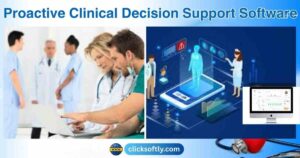
Introduction To Clinical Decision Support
Clinical Decision Support (CDS) software helps healthcare providers make better decisions. It provides timely information and suggestions. This software aims to improve patient care and outcomes.
Purpose And Importance
CDS software assists doctors and nurses. It offers evidence-based recommendations. This helps in diagnosing and treating patients. The software uses data from past cases. It analyzes patterns and trends. This leads to accurate decisions.
CDS software also reduces errors. It alerts providers to potential issues. This includes drug interactions and allergies. It ensures patient safety. The software saves time. Providers can access information quickly. This leads to efficient care.
Click here, best software guide!
Current Challenges In Healthcare
Healthcare faces many challenges. One major issue is data overload. Providers receive vast amounts of information daily. Sorting through this data takes time. CDS software simplifies this process. It filters and presents relevant data.
Another challenge is keeping up with medical advancements. New treatments and guidelines emerge constantly. Providers may struggle to stay updated. CDS software updates regularly. It ensures providers have the latest information.
Lastly, patient care coordination is complex. Multiple providers may be involved in a patient’s care. Communication can be difficult. CDS software integrates information from various sources. It ensures all providers have access to the same data.
Proactive Vs Reactive Systems
Proactive clinical decision support software helps predict patient needs before they arise. It contrasts with reactive systems that address issues only after they occur. This proactive approach enhances patient care by anticipating potential problems and suggesting timely interventions.
In the world of healthcare technology, the distinction between proactive and reactive systems is crucial. Proactive Clinical Decision Support Software is designed to anticipate and address potential health issues before they become critical.
In contrast, reactive systems respond to problems after they’ve already occurred. Understanding these differences can significantly impact patient care and healthcare outcomes.
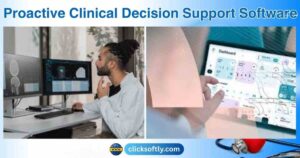
Characteristics Of Proactive Systems
Proactive systems are like having a personal health assistant that never sleeps. They constantly analyze data to predict potential health risks. These systems use algorithms to identify patterns and trends, allowing for early intervention.
Moreover, proactive systems provide timely alerts and reminders to healthcare professionals. This ensures that necessary actions can be taken before a patient’s condition worsens. They prioritize prevention, aiming to reduce the likelihood of emergencies.
Benefits Over Reactive Systems
Proactive systems offer several advantages over their reactive counterparts. They help in reducing hospital admissions by catching issues early. This not only saves costs but also improves patient satisfaction. Imagine receiving a gentle nudge to adjust medication before a complication arises.
Proactive systems enable such timely interventions. They empower healthcare providers to deliver personalized care, tailored to each patient’s unique needs. Reactive systems, on the other hand, often lead to a cycle of crisis management. Would you rather wait for a problem to escalate, or address it before it becomes severe?
Proactive systems shift the focus from treating illnesses to maintaining health. By investing in proactive systems, you pave the way for a healthier, more efficient healthcare environment. With healthcare resources often stretched thin, isn’t it wise to opt for a system that enhances efficiency and effectiveness?
Core Features Of Decision Support Software
Proactive Clinical Decision Support Software (CDSS) offers healthcare professionals crucial tools to improve patient care. Understanding the core features can help you appreciate its benefits. Let’s delve into the essential aspects that make this software invaluable.
Data Integration And Analysis
Data integration is a key feature of CDSS. It gathers information from multiple sources. This includes electronic health records, lab results, and imaging data. The software analyzes this data to provide actionable insights. These insights help healthcare providers make informed decisions.
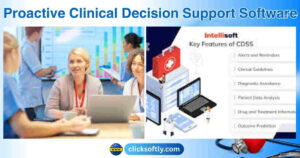
User-friendly Interfaces
A user-friendly interface is essential for effective CDSS. The software presents complex data in a simple, understandable format. Easy navigation helps clinicians find what they need quickly. Clear visuals and intuitive design enhance user experience. This ensures that even non-tech-savvy users can operate it efficiently.
Enhancing Patient Care
Proactive Clinical Decision Support Software helps doctors make better choices quickly. It improves patient care by providing real-time insights. This software ensures accurate and timely decisions for better health outcomes.
Enhancing patient care is at the heart of modern healthcare advancements. Proactive Clinical Decision Support Software is transforming how healthcare providers interact with and treat patients.
By offering timely insights and personalized recommendations, this technology ensures that patient care is not only efficient but also deeply tailored to individual needs.
Timely Interventions
Imagine a scenario where a patient’s symptoms are rapidly progressing. In such cases, every minute counts. Proactive Clinical Decision Support Software can alert healthcare providers to potential complications before they fully develop. This software analyzes real-time data to suggest timely actions.
This can prevent minor issues from becoming major health problems. How often have you wondered if a quicker response could have changed an outcome?
With timely interventions, healthcare professionals can act swiftly, reducing the risk of adverse events. This means better outcomes and peace of mind for both patients and their families.
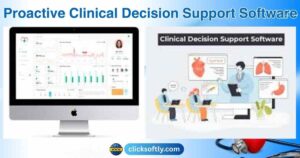
Personalized Treatment Plans
Each patient is unique, and their treatment should reflect that individuality. Proactive Clinical Decision Support Software helps create tailored treatment plans based on specific patient data. By considering factors like medical history, genetic information, and current health status, this software suggests the most effective therapies.
Have you ever felt like your treatment wasn’t quite right for you? Personalized plans aim to eliminate that doubt. Patients receive care that aligns closely with their personal health needs. This not only improves recovery rates but also enhances patient satisfaction.
After all, when you feel understood and valued, your healing journey becomes a positive experience. Incorporating Proactive Clinical Decision Support Software in healthcare settings promises a future where patient care is more responsive and personalized.
As this technology continues to evolve, it will undoubtedly play a pivotal role in shaping the healthcare landscape. How will you benefit from these advancements in your healthcare journey?
Role In Preventive Medicine
Proactive Clinical Decision Support Software is transforming the landscape of preventive medicine. By anticipating health issues before they arise, this technology empowers healthcare professionals to shift from a reactive to a proactive stance.
Imagine a world where your doctor doesn’t just treat illnesses but actively works to prevent them. This is the promise of preventive medicine, and proactive clinical decision support software is key to making it a reality.
Early Detection Of Conditions
Early detection is crucial in preventive medicine. Proactive software analyzes vast amounts of data to spot early warning signs of conditions that might otherwise go unnoticed. This can be life-saving, especially in diseases like cancer where early treatment significantly improves outcomes.
Think about how you monitor your car for issues. The software does the same for your health, scanning for irregularities before they become serious. It’s like having a personal health analyst working around the clock.
But here’s the thought-provoking part: If this software could identify risks well before they manifest, would you still wait for symptoms to appear before consulting your doctor?
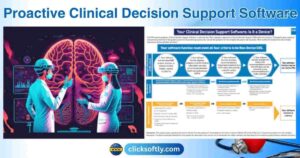
Long-term Health Management
Long-term health management is more than just treating symptoms; it’s about sustaining well-being over the years. Proactive clinical decision support software offers insights into managing chronic conditions and maintaining overall health.
Consider a patient with diabetes. With proactive software, their healthcare plan can be dynamically adjusted based on new data, ensuring their treatment evolves with their condition. This continuous monitoring leads to better health outcomes.
Would you like a future where health management adapts to your needs in real time, giving you and your healthcare provider the tools to make informed decisions?
Proactive clinical decision support software doesn’t just react to what happens; it anticipates what might happen. It’s time to embrace a future where preventive medicine becomes a standard practice, enhancing our health and well-being.
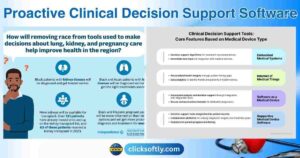
Technological Innovations
Proactive Clinical Decision Support Software enhances healthcare by offering timely, data-driven insights. This technology aids doctors in making better patient care decisions. With real-time analytics, it improves outcomes and reduces errors.
In the ever-evolving world of healthcare, technological innovations are reshaping the landscape of clinical decision support systems (CDSS). These advancements are making healthcare more efficient, accurate, and proactive.
By integrating the latest technologies, CDSS is not just a tool for decision-making but a transformative force in patient care.
Artificial Intelligence Applications
Artificial Intelligence (AI) is at the forefront of these innovations. It enhances the ability of CDSS to analyze vast amounts of data quickly. This means healthcare professionals can make informed decisions faster than ever.
AI can predict patient outcomes, identify potential risks, and recommend personalized treatment plans. Imagine a system that alerts you to a patient’s deteriorating condition before it becomes critical. That’s the power of AI in action.
Moreover, AI applications are improving diagnostic accuracy. By learning from previous cases, AI can suggest potential diagnoses that might not be immediately obvious. This not only supports doctors but also empowers them to provide better care.
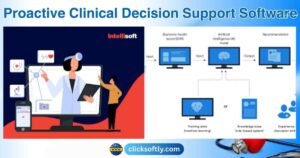
Cloud-based Solutions
Cloud-based solutions are another game-changer for CDSS. They offer flexibility and scalability that traditional systems can’t match. With cloud technology, you can access critical data anytime, anywhere. This accessibility is crucial for healthcare providers who need real-time information at their fingertips.
Whether you’re in a hospital or a remote clinic, cloud-based CDSS ensures you have the data you need. Security is a top concern with cloud solutions, but advancements in encryption and data protection are addressing these challenges.
Your patients’ information remains secure while you benefit from the efficiency of cloud-based systems. How do these technological innovations impact you as a healthcare professional? They streamline your workflow, reduce errors, and ultimately, improve patient outcomes.
Embracing these innovations means better care for your patients and more support for you. Are you ready to take advantage of these advancements in your practice? The future of healthcare is here, and it’s more exciting than ever.
Implementation Challenges
Implementing proactive clinical decision support software often faces hurdles. Integrating with existing systems can be complex. Training healthcare providers also presents significant challenges.
Implementing Proactive Clinical Decision Support Software can transform healthcare, but the journey is rarely straightforward. Many organizations face several hurdles that can slow down progress. Understanding these challenges can prepare you for a smoother implementation process.
Data Privacy Concerns
Protecting patient information is critical. With proactive clinical decision support software, ensuring data privacy can be a daunting task. You must comply with strict regulations like HIPAA, which means carefully managing who can access what data. Think about the last time you shared sensitive information online.
You probably hesitated, right? Patients feel the same way about their medical data. To ease their concerns, implement strong encryption methods and educate your staff about data security. What steps are you taking to ensure data privacy? This is not just a technical issue; it also involves building trust with your patients.
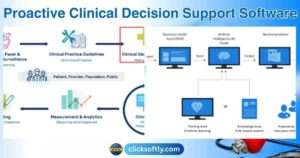
Integration With Existing Systems
Seamless integration with existing systems is crucial. Many healthcare facilities use legacy systems that can be difficult to update or replace. Compatibility issues can lead to delays or even failures in software implementation.
Imagine trying to fit a new piece into an old puzzle. The piece may be perfect, but if it doesn’t fit, it’s useless. Your IT team needs to evaluate current systems and identify potential integration challenges early on. Have you considered the cost of not integrating efficiently?
Poor integration can lead to data silos, which can compromise patient care. By addressing these implementation challenges head-on, you can pave the way for successful deployment. What challenges do you foresee in your implementation journey?
Future Prospects
Proactive Clinical Decision Support Software is evolving rapidly. Its future prospects are promising. This technology is set to transform healthcare. With advancements in software capabilities, its potential impact on global health is significant.
Advancements In Software Capabilities
Software capabilities are improving at an impressive rate. Machine learning algorithms are becoming more refined. They can analyze data quickly. This leads to accurate predictions.
Predictive analytics are also getting more precise. Health professionals can anticipate patient needs better. Automation in data processing saves time. It reduces human error. These advancements make the software more reliable.
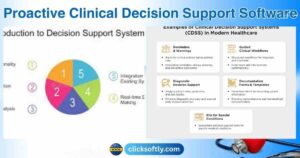
Potential Impact On Global Health
Global health can benefit greatly from this software. It enables better resource allocation. Hospitals can manage supplies more efficiently. Patient outcomes can improve. Timely interventions are possible.
This software supports telemedicine growth. People in remote areas can access healthcare easily. It bridges gaps in medical expertise worldwide.
Collaboration between countries becomes easier. Data sharing enhances research. This can lead to breakthroughs in treatment. Cost-effective solutions arise. Healthcare becomes more accessible to all. These impacts could change global health dynamics.
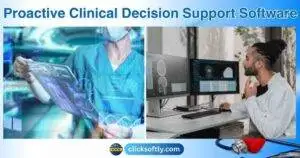
Frequently Asked Questions
What Are The Top Three Clinical Decision Support Systems?
Top clinical decision support systems include IBM Watson Health, Cerner Millennium, and Epic Systems. These platforms enhance clinical workflows and improve patient outcomes.
They provide real-time analytics, integrate with EHRs, and support medical professionals in decision-making processes. These systems are widely recognized for their efficiency and reliability in healthcare settings.
What Is An Example Of Clinical Decision Support Software?
An example of clinical decision support software is Epic Systems. It integrates patient data to enhance decision-making.
It provides real-time alerts, evidence-based guidelines, and predictive analytics, helping healthcare professionals improve patient care. Epic Systems is widely used in hospitals for efficient clinical workflows and data management.
What Are The Three Types Of Clinical Decision Support Systems?
There are three types of clinical decision support systems: knowledge-based systems, non-knowledge-based systems, and hybrid systems. Knowledge-based systems use rules and data. Non-knowledge-based systems rely on machine learning. Hybrid systems combine both approaches for enhanced decision-making support.
Is Epic A Clinical Decision Support System?
Epic is not solely a clinical decision support system. It is a comprehensive electronic health record (EHR) system. Epic includes clinical decision support features to assist healthcare providers in making informed decisions.
Conclusion
Proactive clinical decision support software enhances patient care. It helps doctors make better choices. This technology improves accuracy and speeds up treatment.
Patients receive timely interventions. Hospitals benefit from streamlined processes. Better decisions lead to healthier outcomes. Adopting this software is a smart move for healthcare providers.
It’s crucial for modern medical practice. Investing in these tools is investing in patient health. Stay ahead in medical innovation.


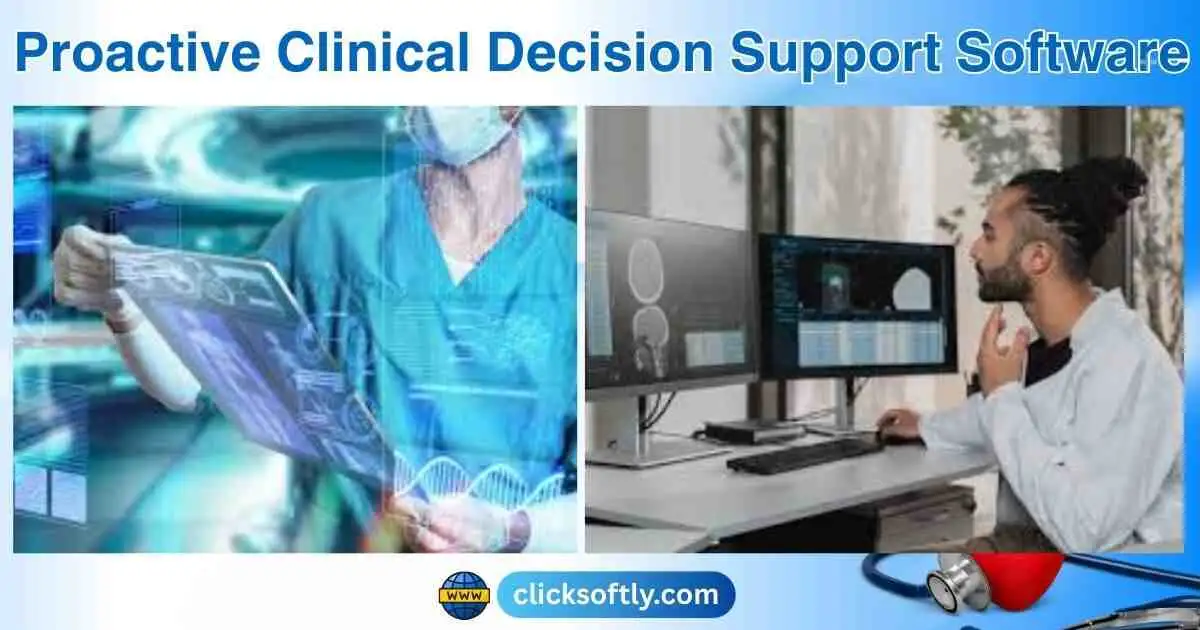
Leave a Reply